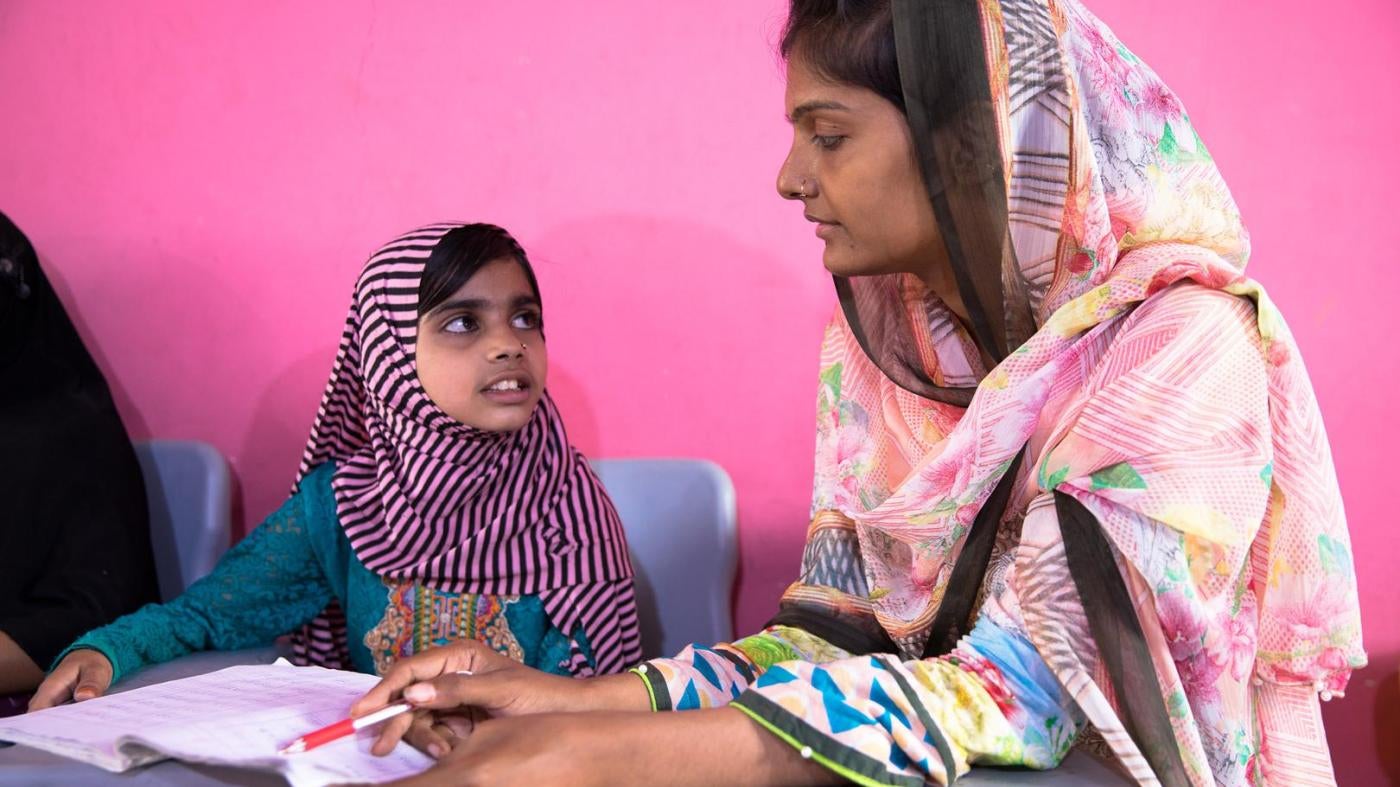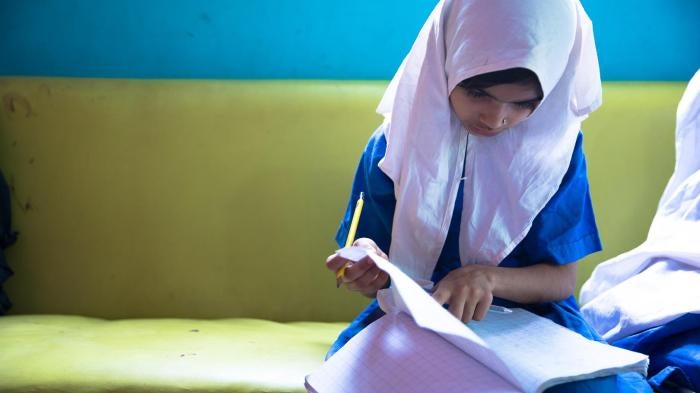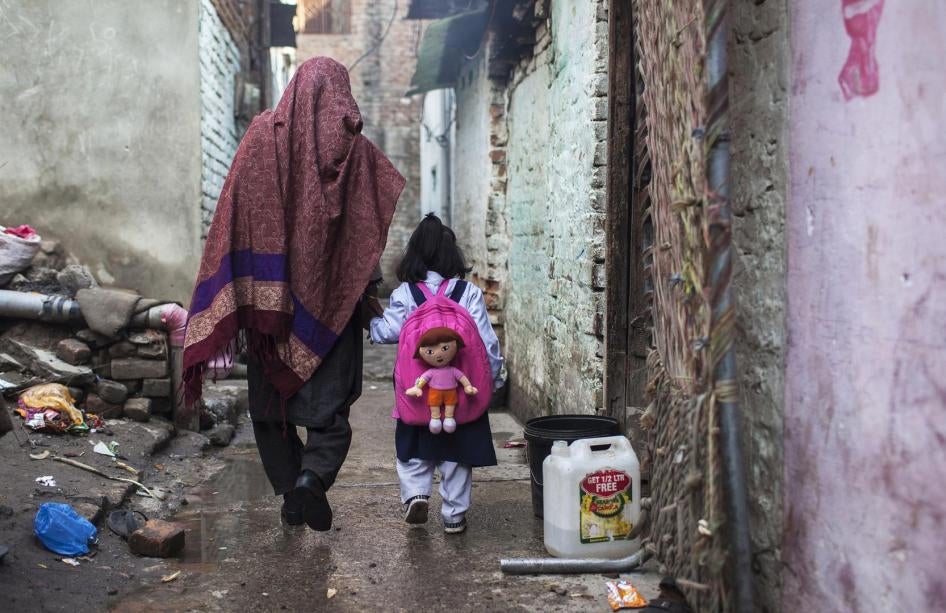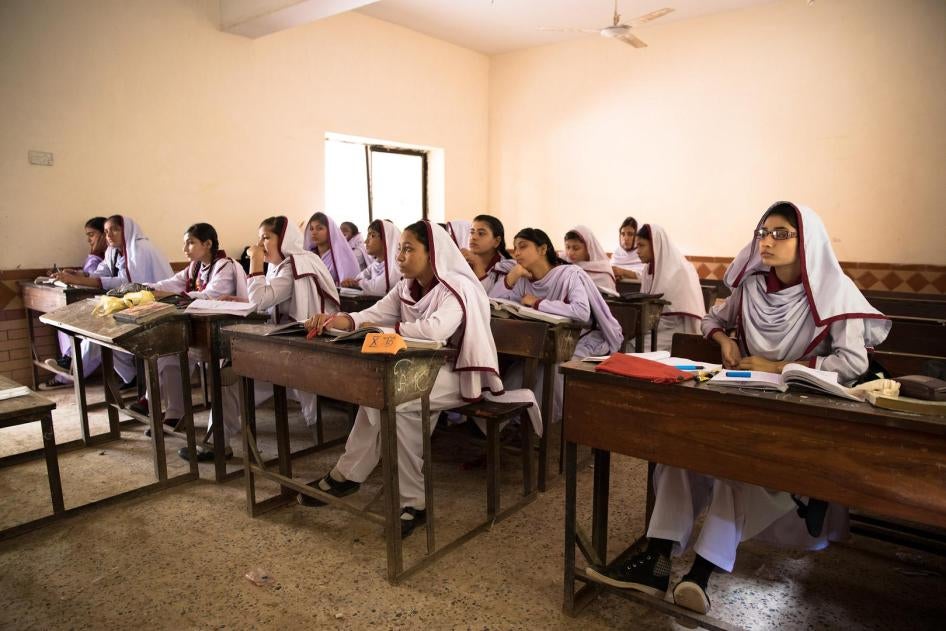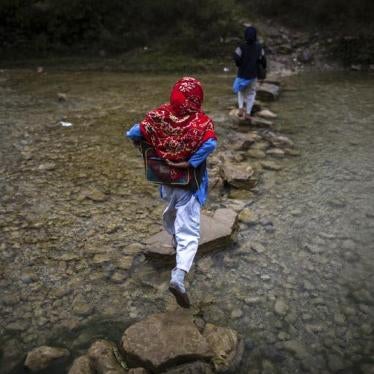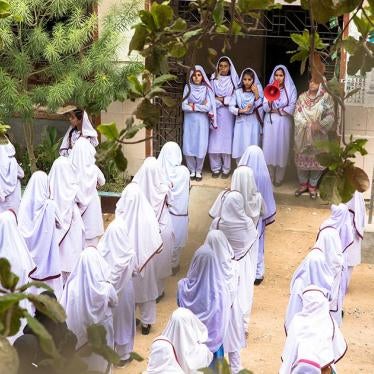She opened the school around 2014 in a room in her grandmother’s home. At first, Shazia only had three students, but she went door-to-door recruiting more children, telling parents about the school and encouraging kids to attend. She makes a special effort to recruit girls, who are less likely than their brothers to be in school. It wasn’t easy – many parents didn’t understand the importance of education, especially for daughters. But the students came, and now around 50 children ages 6 to 17 attend her school, and Shazia has two additional volunteers helping out.
“Every child should acquire an education,” she says.
Yet in Pakistan, nearly 22.5 million children are out of school. The situation is dire for Pakistan’s girls, only 13 percent of whom make it to ninth grade, according to a new Human Rights Watch report, “‘Shall I Feed My Daughter, or Educate Her’: Barriers to Girls’ Education in Pakistan.” One reason is that families simply cannot afford education. While government schools are free, there are too few of them – and families must still pay for uniforms, school supplies, and exam fees. Private schools are too expensive for many poor families. Both government and low-cost private schools sometimes offer poor quality education, leaving people skeptical of school’s benefits.
As ever more poor children grow up illiterate in Pakistan, people like Shazia are taking action in their communities, improvising, teaching children, and trying to bridge the gap between what the government provides and what kids need.
Shazia is young, only 23, and dresses like other women in the area, with a colorful scarf worn loosely around her head and shoulders. She speaks with poise and confidence, and is clearly a force when it comes to realizing her vision.
Her own family was poor – her mother passed away when she was only 4 or 5 – but her father saw to it that she received a good education. She grew up in Lyari, but at that time, the neighborhood was safe and she and the other kids played in the streets. This changed by the time she was old enough to take her high school exams. “We used to be really scared that [someone] might start firing over here any minute or a bomb could land here anytime.”
Also, the schools weren’t good. As they still do today, people sometimes obtained teaching contracts through corruption, keeping the salary without showing up. Regularly without a teacher, Shazia would often teach herself her lessons.
In her school, Shazia teaches Urdu, English, and math, and the kids read poetry. But before starting lessons, she plays indoor games with the children and teaches them soccer and boxing. Otherwise, the children would never come back, she says. Once they like coming to the school, the academic lessons begin.
Many of her students have never been to school. “We have a lot of girls, especially girls who cannot read anything. They cannot even read their own names,” she says. The gang violence, which peaked in 2015 but has since been quelled, interrupted the education of some of her kids. Older children who haven’t attended schools are told they are too old to enroll in government schools – hers is possibly their only option.
But it’s not easy convincing parents to let their children take classes. Many parents never went to school, Shazia says, and expect children to work, selling merchandise or food on the street or doing work like sewing or embroidery at home. Girls are often also responsible for household work and fetching water. Some girls who come to Shazia’s school have to look after their younger siblings while their mom works. “Girls leaving their house is thought of as something really wrong,” she said.
But these challenges don’t stop Shazia. She tells parents that their children need a place to go while they work, otherwise they could get in trouble. A few parents still refuse. But some of the children come despite this, because they want to and no one is home to stop them. Ten or 15 children study with her in the evening after working all day.
Shazia admits the children can be difficult. It’s hard to control them as they’re not used to adults telling them what to do, and some act out because of problems at home. At first, Shazia was very gentle, but they didn’t listen to her. Over time, she learned that by being stricter – for example, telling the kids that if they didn’t listen, she won’t let them play games – the children began to listen to her. No adult at her school is ever allowed to hit children.
Because the kids don’t have backpacks or books, Shazia often buys supplies with her own money. Her school is also supported by local nongovernmental organizations, like Arado Pakistan, which has donated furniture and paper. “It’s very difficult to keep this school running, but it is also not impossible.”
She’s extremely grateful to her family – they allowed her to quit a paying job to work for free for the betterment of her community – and to her grandmother specifically, who let her start the school in her home.
She hopes her school is a haven for all students, and especially for girls, who make up 70 percent of her students. She says most people in her community don’t believe girls can or should work at an office or get a job outside of the country like boys can. She disagrees. “If we want to change this mind set now, we’d have to change ourselves,” she says, believing parents of girls should give them “encouragement and convince them to go further.”
Her goal is not just to teach her students how to read and write, but how to be good human beings. “Who knows what they’ll do when they grow up?” she says.
